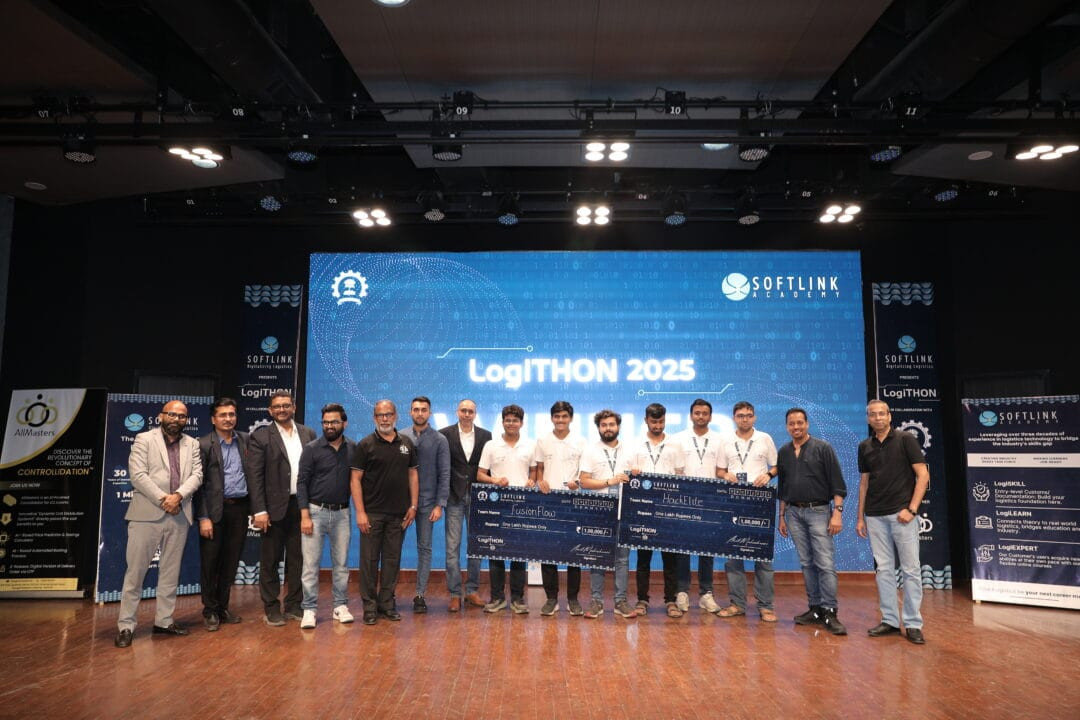The increasing emphasis on technological integration in the logistics sector was highlighted in Logithon 2025, held at IIT Bombay and arranged by Softlink Global in collaboration with Softlink Academy, IEOR and IIT BOMBAY. The event attracted more than 1,500 students from more than 250 engineering colleges, and aimed to address critical logistical challenges through innovative solutions, especially those relevant to the air freight industry.
To address key challenges in air cargo logistics
The core focus of Logithon 2025 was to generate solutions for two urgent logistics issues: Borderluent Compliance and Multimodal Route Optimization. Both of these areas remain particularly relevant to the air freight sector, which regularly experiences operational inefficiencies due to fragmented regulatory frameworks and insufficient route planning.
As the demand for air freight continues to rise, powered by high value sectors such as pharmaceutical products, electronics and perishable products, stakeholders are increasingly concerned about inefficiencies in customs clearance processes and the optimization of routes. According to estimates, India aims to increase its air freight from approximately 3.5 million tonnes in 2024 to 10 million tonnes by 2030. To achieve this, the industry must address both infrastructure bottles and regulatory complexities.
Business Leaders and Technological Integration
The judging panel of the event contains prominent operating rates, including Dushyant Mulani (chairman, Fffai), R. Radhakrishnan (chairman Emeritus, Clearhip Group), and Amit Maheshwari (CEO, Softlink Global). Their participation underlines the growing interest of the logistics sector in accepting technological solutions to increase operational efficiency.
Amit Maheshwari emphasized the growing role of technology, saying: ‘Technology is not an option – it is the backbone of modern logistics. The solutions offered during Logithon 2025 demonstrate the readiness of the next generation engineers to drive transformative change. “This observation reflects the broader tendency of the industry after the utilization of artificial intelligence (AI), automation and digital intelligence to improve the resilience and efficiency of the supply chain.
Technological innovations and its impact on air freight
The technological innovations displayed at Logithon 2025 have the potential to significantly transform the air freight industry, especially by improving operational efficiency, regulatory compliance and digital integration. Since India is aimed at establishing itself as a global logistics center, this technological progress is expected to play an important role in the streamline of processes and promoting seamless connectivity.
Effective route optimization mechanisms occur as critical tools to improve the efficiency of transport. By reducing transport times and reducing operating costs, such innovations can speed up the delivery of time -sensitive cargo, including goods such as pharmaceutical products, electronics and perishable goods. The deployment of advanced route planning systems is expected to improve both reliability and cost-effectiveness in the supply chain.
Regulatory compliance can also benefit from technological integration. Digital instruments aimed at simplifying customs processes can increase borderline trading efficiency and minimize administrative delays. This improvement is essential for maintaining competitiveness in an increasingly interconnected global trading environment. By providing stakeholders with streamlined procedures, the adoption of innovative compliance mechanisms can lead to more predictable and reliable cargo flow.
Furthermore, the integration of artificial intelligence (AI) and digital technologies is focused on a revolution of freight management systems. Improved predictive analysis, real -time freight detection and automatic decision -making processes are expected to improve transparency and operational reliability. This progress is in line with broader industry trends after digitalization and smart logistics, reflecting the need for scalable and effective technological solutions.
Although the potential benefits of technological integration are visible, stakeholders warn that this progress alone will not be sufficient to drive growth in the air freight sector. Coherent policy frameworks, robust infrastructure development and strategic investments will be essential to maximize the impact of these innovations. Policymakers are requested to address regulatory contradictions and to promote public-private partnerships that can facilitate the implementation of these technologies.
As the air freight industry continues to develop, technological innovation will remain an important determination of the ability to improve efficiency, resilience and sustainability. The insights obtained from Logithon 2025 underline the importance of promoting cooperation between stakeholders in the industry, policymakers and academic institutions to develop a future-ready air freight ecosystem.
Policy implications and cooperation in the industry
The success of Logithon 2025 has broader implications for cooperation in the operating academy, especially with regard to policy development aimed at improving logistics efficiency. R. Radhakrishnan, who talks about the relevance of the event, noted: “In today’s rapidly developing logistics environment, collaboration between academic institutions and industry stakeholders is essential for the promotion of innovation and ensuring future readiness.”
In addition, the initiative includes well in line with the goals of the Indian government to promote digitalization and technological integration in various sectors, including air freight. Policymakers are encouraged to investigate public-private partnerships to facilitate the implementation of technological solutions developed by such initiatives.
Future prospects and strategic recommendations
While Softlink Global still gets technological innovation by Logithon champion, the air freight industry is expected to benefit from improved operational efficiency, compliance mechanisms and cost-effectiveness. However, achieving scalability will be needed to address infrastructure deficits, harmonize regulatory standards and promote investments in AI and digital instruments.
If you are moving forward, industry stakeholders and policy makers must work together to ensure that technological advances are effectively integrated into the air freight ecosystem. The continued success of initiatives such as Logithon can serve as a catalyst for broader reforms, which increases India’s competitiveness within the global air freight market.


